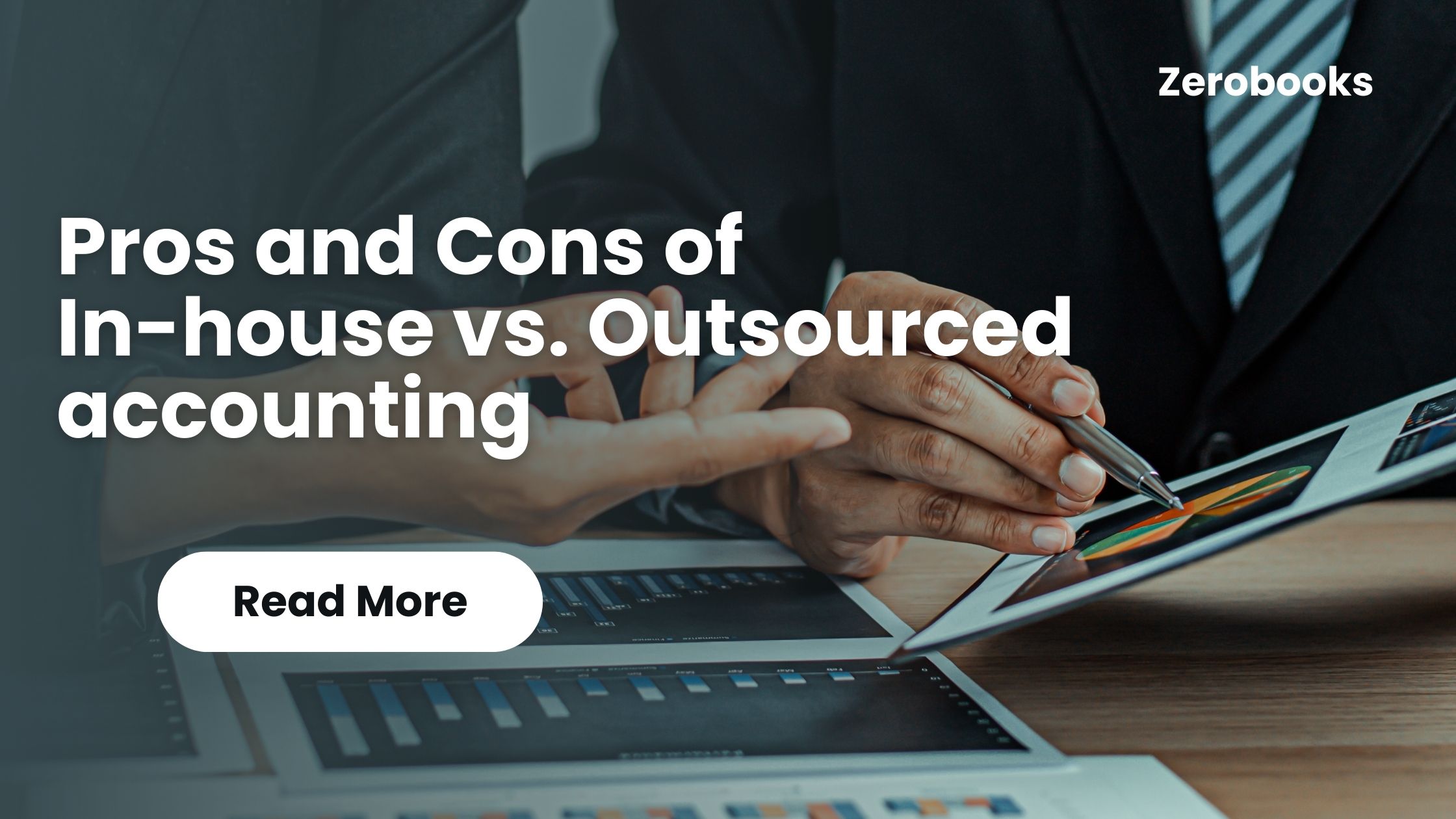
The Pros and Cons of In-house vs. Outsourced Accounting
seo
Accounting is a crucial stage in any organization since it guarantees proper record-keeping of finances and promotes the ability to make well-informed choices.
When it comes to managing accounting tasks, businesses have the option to handle it in-house or outsource it to external professionals.
Both accounting is good to use but also they have some pros as well as cons if you really want to run your business financially stress-free, then Zerobooks.com is the best online service provider regarding in-house and outsourced bookkeeping service that can stream
line your accounting processes and also helps your business finance .
What is In-house Accounting?
In-house accounting in simple words, establishing an accounting department within the organization itself. This department consists of dedicated accountants who handle financial tasks such as bookkeeping, payroll, and financial reporting. In-house accounting involves hiring and managing an accounting team within the organization. Accounting services like as bookkeeping, payroll administration, financial reporting, and tax compliance are handled by these accountants.
Pros of In-house Accounting
Familiarity and control: With in-house accounting, you have direct control over your financial processes. The accounting team becomes familiar with your business operations and can tailor accounting procedures to suit your specific needs. This allows for a personalized approach to financial management.
Quick response time: Having accountants physically present in the same office enables faster response times for financial inquiries and immediate assistance when required.
This promotes efficient communication and prompt resolution of accounting-related issues.
Confidentiality and security: By keeping accounting functions within the organization, you have greater control over the confidentiality and security of your financial data. This reduces the risk of sensitive information being exposed to external parties.
A better understanding of business intricacies: The financial complexities of your business, including income sources, costs, and difficulties unique to your sector, are better understood by in-house accountants.
Alignment with company culture and values: In-house accountants are part of your organization, contributing to its culture and values. They have a better understanding of your business objectives and can align their financial practices accordingly.
Enhanced collaboration and teamwork: In-house accounting fosters collaboration between different departments, promoting a cohesive approach to financial management.
Accountants can work closely with other teams to ensure accurate financial reporting and decision-making.
Cons of In-house Accounting
Costly infrastructure and resources: Establishing and maintaining an in-house accounting department involves expenses such as hiring, training, salaries, office space, and accounting software.
Limited expertise and specialization: In-house accountants may possess general accounting knowledge, but they might lack specialized expertise in areas such as tax planning or auditing. This could result in suboptimal financial management in complex or specialized scenarios.
Risk of employee turnover: In-house accounting teams are susceptible to employee turnover, which can disrupt financial processes and require additional time and resources for the recruitment and training of new accountants.
Administrative burden: Managing an in-house accounting team requires administrative tasks such as recruitment, training, and performance evaluations. These responsibilities can divert focus from core business operations and strategic decision-making.
Lack of external perspective: In-house accountants may be limited in their exposure to external industry trends and practices. This could result in a narrower perspective on financial management and potentially miss out on innovative approaches.
Potential for bias and conflicts of interest: The financial complexities of your business, including income sources, costs, and difficulties unique to your sector, are better understood by in-house accountants.
What is Outsourced Accounting ?
When a business opts for outsourced accounting, they enter into a contractual agreement with the external service provider. The provider then assumes responsibility for managing and performing the agreed-upon accounting tasks on behalf of the business. This arrangement allows the business to focus on core operations while leaving the financial management in the hands of experienced professionals.
Pros of Outsourced Accounting
Cost-effectiveness: Compared to keeping an in-house department, outsourcing accounting services might be more cost-effective. It helps to reduce the expenses related to salaries, benefits, training, and infrastructure. Businesses can save significant costs and allocate resources to other critical areas.
Expertise and specialization: Outsourced accounting professionals bring specialized knowledge and expertise to the table. They stay updated on the latest regulations, accounting standards, and industry best practices.
This ensures accurate financial management and access to specialized skills that may not be available in-house.
Scalability and flexibility: According to the shifting demands of the company, outsourced accounting services are flexible enough to scale up or down. As your business grows or experiences fluctuations, outsourcing allows for easy adjustments without the need for hiring or downsizing.
Time-saving: By outsourcing accounting tasks, businesses can save valuable time that would otherwise be spent on managing complex financial processes. This allows the management team to focus on core business activities, strategic planning, and growth initiatives.
Access to advanced technology: Outsourced accounting firms often invest in advanced accounting software and tools. By outsourcing, businesses gain access to these technologies without incurring additional costs, ensuring efficient and streamlined financial processes.
Reduced risk and compliance: Outsourced accounting professionals are well-versed in compliance requirements and tax regulations. They help businesses navigate complex financial landscapes, reducing the risk of errors, penalties, and non-compliance.
Cons of Outsourced Accounting
Communication challenges: Establishing clear communication channels with external accounting professionals is crucial for successful collaboration. Language barriers, time zone differences, or lack of regular face-to-face interactions can sometimes pose challenges and require effective communication strategies.
Potential security risks: Outsourcing accounting tasks involves sharing sensitive financial data with external parties. It is essential to thoroughly vet the reputation and security measures of the accounting firm or professional to mitigate potential risks of data breaches or unauthorized access.
Dependency on external providers: Outsourcing accounting means relying on external providers for critical financial tasks. Any issues with their availability, responsiveness, or quality of work could potentially impact the business’s financial operations and decision-making.
Loss of control: By outsourcing accounting functions, businesses relinquish direct control over certain aspects of financial management. Some business owners may feel uneasy about this lack of authority, especially when it comes to delicate financial problems.
Lack of familiarity with the business: Outsourced accounting professionals may take time to become familiar with the business’s specific operations, processes, and industry nuances.
This initial learning curve may require close collaboration and effective communication to ensure accurate financial management. Potential for misalignment with company values: A potential incompatibility with the company’s culture, beliefs, and long-term goals exists since outsourced accounting specialists are not internal to the organization.
Choosing between in-house accounting and outsourced accounting requires careful consideration of the pros and cons outlined above. larger enterprises with complex accounting needs and a greater need for control might prefer in-house accounting.
Consider your business goals, budget, and required expertise to make the right choice.
To simplify your accounting processes and save time, you can explore the services of Zerobooks.com, an online bookkeeping service. With our expertise and user-friendly platform, Zerobooks can streamline your accounting tasks and ensure accurate financial management.



